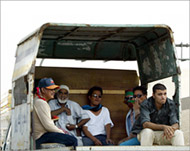Report slams Saudi abuse of workers
Foreign workers in Saudi Arabia face torture and work in conditions similar to slavery, according to a damning Human Rights Watch report.

The plight of foreign workers, who make up a third of the kingdom’s population, was examined in the rights watchdog’s report, “Bad Dreams: Exploitation and Abuse of Migrant Workers in Saudi Arabia,” released on Thursday.
“Saudi Arabia’s troubles run much deeper than the terror attacks that are claiming the lives of innocent civilians,” said Sarah Leah Whitson, executive director of Human Rights Watch’s Middle East and North Africa Division.
“Case after case demonstrates that the Saudis are turning a blind eye to systematic abuses against foreign workers,” she said.
The report was based on interviews conducted mainly in India, Bangladesh and the Philippines with workers who had recently returned from the kingdom. A Human Rights Watch delegation, who had visited Saudi last year for talks with officials, were not allowed to conduct field research or speak to victims of abuse.
The report includes four cases of women who were victims of forced confinement and sexual abuse, including rape. In all four cases, the perpetrators – three of whom were alleged rapists – did not face criminal investigation or prosecution.
The report also has information about women whom Human Rights Watch found in a prison in Riyadh who were serving sentences for “illegal pregnancies”.
|
“The abuses we found against foreign workers demonstrate appalling flaws in the kingdom’s criminal justice system as a whole. If the Saudi government is serious about reform, this would be a good place to start” Sarah Leah Whitson, |
“The pervasive gender discrimination in Saudi Arabia’s legal system, coupled with law enforcement officials’ indifference to women’s complaints, places them at great risk,” said Whitson. “Add forced confinement to this mix, and the danger of sexual violence is only heightened.”
The report called on the government to halt the arrest and imprisonment of women who become pregnant voluntarily or because they were victims of rape.
Justice system failures
The report also highlighted what it described as the utter failure of the justice system to provide redress.
Members of the labour force detained after being accused of crimes were denied consular visits and forced to sign confessions they cannot read when they are accused of crimes, said the report.
In some cases, only after suspects were beheaded were their embassies and families informed.
“The abuses we found against foreign workers demonstrate appalling flaws in the kingdom’s criminal justice system as a whole. If the Saudi government is serious about reform, this would be a good place to start,” said Whitson.
The report documents the failure of Riyadh to enforce its own labour laws in the face of significant abuses of foreign workers.
Foreign work force
There are 8.8 million foreigners in Saudi Arabia, according to Riyadh’s Labour Minister Dr Ghazi al-Ghosaibi, a figure significantly higher than any that the government has previously reported.
 |
|
There is one foreign resident for |
With an indigenous population of about 17 million, this means that there is almost one foreign resident for every two Saudi citizens.
The largest expatriate communities in Saudi Arabia include one million to 1.5 million people each from Bangladesh, India and Pakistan, and another 900,000 each from Egypt, Sudan and the Philippines. There are also 500,000 workers from Indonesia, and another 350,000 from Sri Lanka.
Response
A Saudi rights group said on Thursday it was ready to strive to redress alleged abuses against foreign workers cited in the rights watchdog’s report.
The recently formed National Human Rights Association “has not received any of the complaints cited in the report of New York-based Human Rights Watch,” said spokesman Bandar bin Muhammad al-Hajjar.
But the NHRA, set up in March with government backing, “looks forward to seeing the full report and getting to know the people who have been aggrieved and the sides who caused (the harm) in order to take up their cases,” he said in a statement.